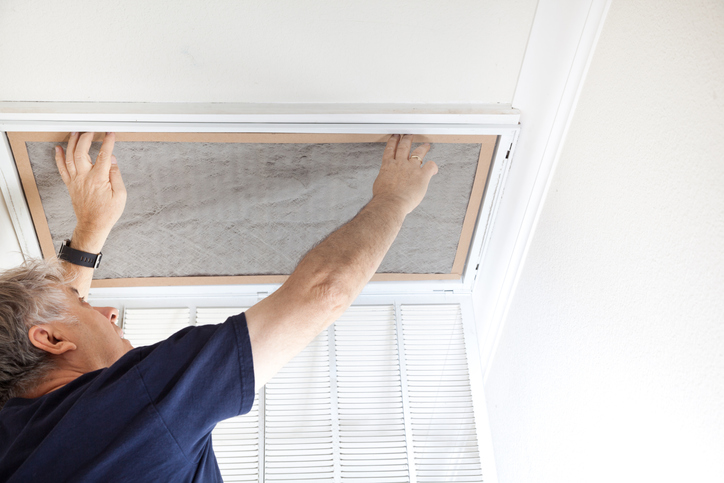A heating, ventilation, and air conditioning (HVAC) system is fairly complex. It’s arguably the most complex system in a house after the electricity and plumbing. But did you know one $10 component could bring the whole system to a halt? And it’s a component that is extremely easy to maintain.
That all-important component is the air filter. It serves a few vital purposes, and in the process, it can actually make the HVAC system run more efficiently.
How an Air Filter Can Help You Conserve Energy
Your HVAC system consists of tightly configured equipment that needs to run smoothly. Anything that gets in the way can cause the equipment to work harder, and that includes tiny bits of dust and dirt that build up over time.
An HVAC system circulates the air through a home. That means it is continuously drawing air back into the system to cool or heat the air before pushing it back out into the living spaces. An air filter is designed to trap airborne contaminants as air comes back into the system. As the air passes through the filter’s material contaminants are trapped and pulled out of the air.
By keeping contaminants out of the HVAC system, air filters help the equipment run as efficiently as possible. The U.S. Department of Energy estimates that proper air filter use can reduce HVAC energy use by 5-15%.
That is, as long as you clean or replace the filters when they are too dirty to trap contaminants. When this happens the dirty air filter will actually reduce airflow and make the HVAC system work harder. Increased energy bills can be a sign that it’s time to change your air filter.
Air filters should be checked once a month. A fiberglass air filter generally lasts just one month, and pleated air filters should be replaced at least once every three months. During the summer and winter when the HVAC system runs more hours in the day you may want to change or clean the air filter every month.
What’s With All the Different Air Filters?
AC air filter, HVAC air filter, furnace air filter – if you’re searching for a replacement air filter it may not be as easy as you think? There are so many options today knowing which one will help you conserve the most energy can be a challenge.
For the most part, these air filters serve the same purpose – they filter air contaminants to protect the HVAC system. But there can be differences in how they are installed.
For instance, a furnace filter goes into a compartment at the furnace’s air intake. Then there could be a separate air filter for the AC equipment. But many of today’s modern HVAC systems are designed to have a single air intake system that only needs one HVAC air filter.
When in doubt, check out the air filter that’s already in place. It should note the type of filter material that’s used, the size, and the MERV rating.
Fiberglass Air Filters vs Pleated Air Filters
There are two primary types of air filters based on construction and materials: fiberglass air filters and pleated air filters.
A fiberglass air filter has a filtering material made of spun fiberglass that’s been tightly interwoven. It’s also sometimes called a flat filter because the fiberglass material lays flat.
A pleated air filter has a cotton or paper filter material that’s pleated. This allows for more surface area within the same filter dimensions. Unlike fiberglass air filters, pleated air filters can also be recycled.
Pleated air filters are considered to be the superior option for clearing the air of contaminants without reducing airflow. Because they are also able to hold more, pleated air filters need to be replaced less often.
Air Filters by MERV Rating
The Minimum Efficiency Rating Value (MERV) scale is used to indicate how well an air filter purifies the air. The scale goes from 1 to 20 MERV with 1 being the least amount of filtration and 20 being the most.
Fiberglass air filters typically have a MERV rating between 2-5.
Pleated air filters usually have a 7-13 MERV rating.
People who want the best balance of air filtration and energy efficiency should choose an air filter with a 12-13 MERV rating. Air filters with a MERV rating over 13 aren’t recommended because they can restrict the airflow. This will make the HVAC system work harder and could actually increase energy use instead of reducing it. There’s also a greater risk of premature wear and tear on the HVAC system.
Why HEPA Air Filters Aren’t Always the Best
You’ve probably heard about HEPA filters (High-Efficiency Particulate Air filters) and how amazing they are at purifying the air. That’s why they are the standard filter in air purifiers. However, they aren’t recommended for HVAC use.
A HEPA filter has a MERV rating of 17-20. That means HEPA filters are even better at trapping contaminants than a MERV 13 filter, but they are also thicker. A HEPA air filter ends up being far too restrictive and the airflow to the HVAC system isn’t adequate.
If you want extra air purification you can always add a portable air purifier to any room in the house. As an added bonus the extra filtration is good for the HVAC system and will help the air filter last a little longer.
As a Major Energy customer, you can expect to get valuable information that helps you use less and save more. See the current rates for Major Energy electric and natural gas plans in the Northeast.
